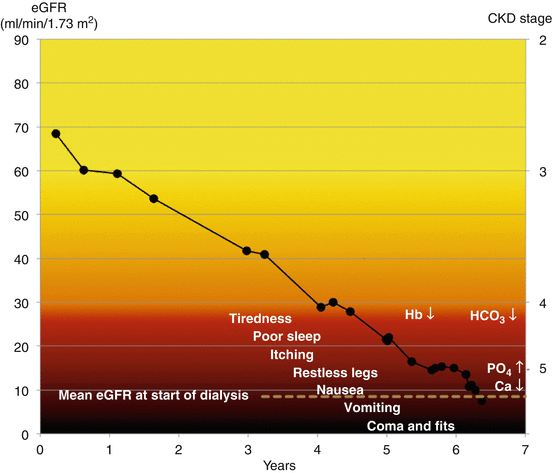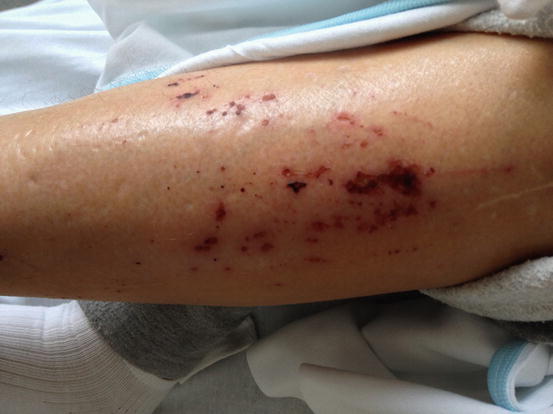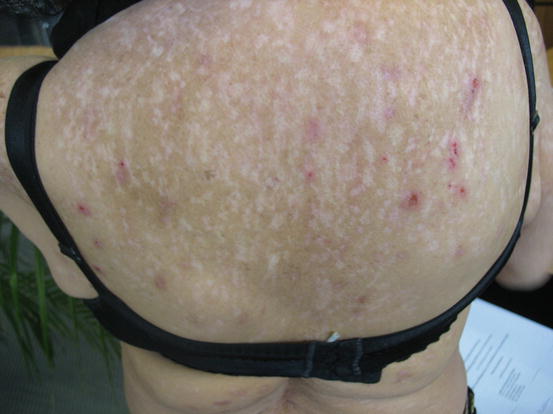, Mark Thomas1 and David Milford2
(1)
Department of Renal Medicine, Birmingham Heartlands Hospital, Birmingham, UK
(2)
Birmingham Children’s Hospital, Birmingham, UK
Abstract
In this chapter we explain:
How symptoms change as kidney function declines
How uraemia affects the nervous system
Stages of CKD
As the GFR declines, symptoms and signs of kidney failure become more common and more severe (see Fig. 4.1). To reflect that, CKD is graded into five stages by eGFR: G1–G5.


Fig. 4.1
The common symptoms experienced by patients at different stages of chronic kidney disease
Patients with eGFR >60 need to have other evidence of kidney disease, such as proteinuria or a structural abnormality, to qualify as having Stage G1 (eGFR >90) or Stage G2 (eGFR 60–89). Stage G3 is divided into G3a (eGFR 45–60 ml/min/1.73 m2) and G3b (eGFR 30–45). Stage G4 is eGFR 15–29 ml/min/1.73 m2 and G5 is eGFR <15 ml/min/1.73 m2.
The definition of CKD requires two reduced eGFR readings at least 3 months apart to confirm that the disease is chronic and implications for health to justify the term ‘disease’. The full classification of someone with CKD requires the underlying cause, the eGFR and the level of albuminuria (see Sect. “Proteinuria” in page 143) [1].
Kidney failure does not make you feel very ill until it is advanced, so taking a history from a patient with kidney disease is little help in judging kidney function. The severity of symptoms experienced at a given level of eGFR varies considerably between individuals, some people remaining asymptomatic despite very low function.
The duration of symptoms is not a reliable guide to how quickly kidney failure has developed. Patients with chronic kidney disease may present acutely after a long period of symptomless disease (see Patient 4.1).
Uraemia and the Nervous System
As GFR falls below 45 the commonest symptom is fatigue , defined as extreme and persistent tiredness, weakness or exhaustion – either mental, physical or both [2]. Patients whose GFR declines very slowly and are otherwise well may adjust their lifestyle and expectations to their gradually increasing fatigue.
As GFR declines below 20, symptoms such as insomnia , restless legs and itching (uraemic pruritus ) increase.
Restless legs syndrome is a curious unpleasant symptom that patients characteristically find hard to describe. They refer to throbbing, pulling or creeping sensations inside their legs and have an uncontrollable urge to move them. The symptoms are worse when relaxing and are often worst at night. Moving the legs temporarily eases the feeling.
Itching is a major debilitating symptom for some patients with CKD stage G5, both before and after starting dialysis. Its constant presence, especially at night, leads to exhaustion and depression (Patient 4.1). Severe itching is even associated with increased mortality [3].
Patient 4.1: Severe Uraemic Pruritus
Vanessa had been on dialysis for 12 years. Over recent months, she had suffered from severe itching that stopped her getting to sleep and disrupted her family life. The itching on her back was so bad that she used an old belt to scratch herself, making her skin bleed.
She describes her symptoms in a video interview at vimeo.com/49458473 (Fig. 4.2).
The itching may be associated with dry skin but there is usually no rash. Constant scratching causes bleeding and scarring (see Figs. 4.3 and 4.4).



Fig. 4.3
Bleeding caused by scratching due to uraemic pruritus (Photograph courtesy of Prof. Dr. med. Thomas Mettang)

Fig 4.4
Scratch marks and scarring caused by persistent scratching due to uraemic pruritus (Photograph courtesy of Prof. Dr. med. Thomas Mettang)
The pathophysiology of these symptoms is not fully understood. As they often occur together, it is likely they are mediated by neuronal ‘over activity’ possibly due to the effects of uraemia on the nervous system [4].
Treatment of severe insomnia, restless legs and itching requires careful use of drugs that modify neurotransmission. Gabapentin and pregabalin can be particularly helpful for all these symptoms [5, 6]. The effect of gabapentin on itching is often dramatic, a single tablet switching off the symptom (Patient 4.1 continued). This supports the theory that itch is caused by excessive activity of the nerve fibres that transmit the sensation [7].
Stay updated, free articles. Join our Telegram channel

Full access? Get Clinical Tree









